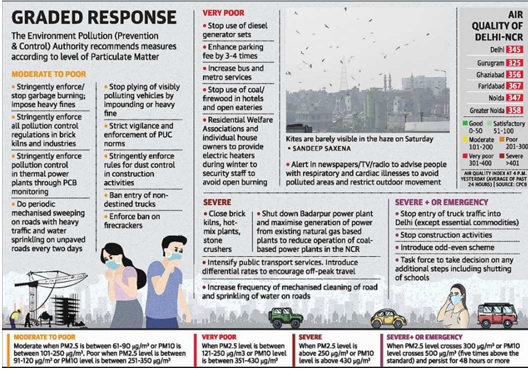
Graded Response Action Plan for Delhi Pollution
Why is it in News?
- Air pollution control measures under the “very poor” and “severe” categories of the Graded Response Action Plan (GRAP) have been enforced in the NCR cities.
Details:
- The Supreme Court-appointed Environment Pollution (Prevention & Control) Authority (EPCA) had written to various States to implement the GRAP measures.
- If the pollution of Delhi further increases, then GRAP measures under “severe+ or emergency” category.
- The GRAP is a set of emergency measures to be taken to reduce air pollution.
- GRAP Measures:
(1) stopping entry of trucks into Delhi,
(2) stopping construction activities
(3) implementing the odd-even scheme.
- The severe+ measures are implemented when –
(1) Tthe PM2.5 level crosses 300 microgram per cubic metr
or
PM10 level crosses 500 microgram per cubic metre
(2) And persist for 48 hours or more.
- Delhi government special measures:
(1) It has been carrying out an anti-dust campaign and has imposed fines as high as ₹50 lakh on a single violator.
(2) The government has also created a dedicated war room to monitor air pollution levels.
(3) The Delhi pollution control committee has identified 13 pollution hotspots in the city.
(4) It announced Electric Vehicle policy under which incentives and benefits are extended to those buying electric vehicles.

Other measures:
(1) Anti-smog guns at construction sites, a dedicated air monitoring cell, and night patrolling are some of the new initiatives taken by the Gurugram pollution control board.
(2) It has put into place the measures that includes ban on diesel generator sets, monitoring of open burning of the waste and mechanised sweeping of the roads.
(3) 45 devices are installed for monitoring of air emission in ‘red category’ industrial units and the real time data provided on the HSPCB and Central Pollution Control Board server for monitoring.

